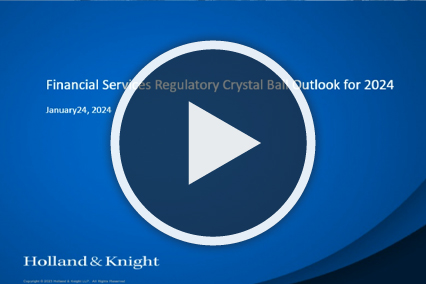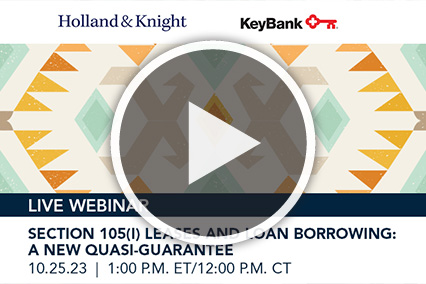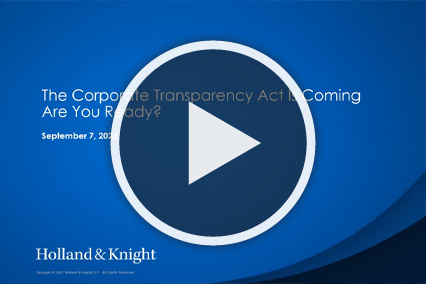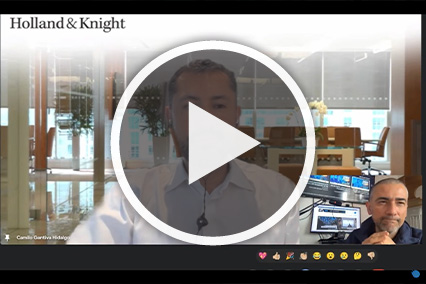Servicios Financieros
- Holland & Knight representa una amplia gama de clientes nacionales e internacionales, incluyendo instituciones financieras, en transacciones que involucran una financiación.
- Ayudamos a los clientes a navegar las tendencias y regulación en mercados nuevos y emergentes, y gestionar cambios operativos.
- Los intereses de nuestros clientes abarcan todo el ámbito del mercado financiero estadounidense e internacional.

Visión General
Servicios para Empresas que Buscan Financiación
A pesar de la recesión económica sin precedentes y de nuevas normativas bancarias, el carácter básico de las transacciones comerciales no ha cambiado. Aunque normativas adicionales pueden añadir un nivel de complejidad a dichas transacciones, financiaciones sofisticadas continúan respaldando el flujo de negocios. Nuestra amplia experiencia nos permite conocer y entender la rápida evolución de los estándares del mercado para los diferentes tipos de transacciones. En este sentido, nuestros abogados de servicios financieros en Estados Unidos y América Latina están específicamente capacitados para asesorar a nuestros clientes en los siguientes ámbitos:
- financiación de operaciones aeronáuticas
- préstamos comerciales
- financiación y arrendamiento de equipos
- transacciones marítimas, quiebras y reestructuraciones
- fusiones y adquisiciones
- financiación pública, incluidos swaps y derivados
- asociaciones público-privadas
- financiación inmobiliaria
- titularización
- financiación estructurada
- operaciones de crédito fiscal
- financiación respaldada por depósitos de mercaderías
- reestructuraciones e insolvencias
Servicios para Instituciones Financieras
El Equipo de Servicios Financieros de Holland & Knight está integrado por profesionales con estrategias innovadoras, litigantes experimentados y abogados transaccionales con experiencia práctica y relaciones a largo plazo con el sector bancario y de corretaje. Entendemos cómo funcionan los negocios de nuestros clientes, estamos íntimamente familiarizados con la normativa y contamos con la perspectiva cumulativa tras años de experiencia. Las nuevas normativas que regulan la industria de servicios financieros han creado retos de fondo y sin precedentes en relación con la gestión del riesgo, el logro de la eficiencia operativa y la resolución de los problemas de financiación.
Además, las quiebras bancarias, la convergencia, la consolidación y la globalización han amenazado a la industria y la siguen redefiniendo. Dado que es mucho lo que está en juego, los bancos, prestamistas, intermediarios y otras instituciones financieras buscan nuestro asesoramiento jurídico para que les apoyemos en navegar por las nuevas y emergentes realidades del mercado y gestionar los cambios normativos y operativos. Además de los servicios señalados anteriormente, que reflejan las necesidades potenciales de cualquier negocio involucrado en una financiación, proporcionamos un apoyo integral e informado a nuestros clientes bancarios, corredores de bolsa y entidades financieras en áreas adicionales:
- préstamos garantizados con obras de arte
- prevención del lavado de activos
- regulación bancaria
- quiebras bancarias
- Comisión de Bolsa y Valores de los EE.UU. (SEC, por sus siglas en inglés), la Autoridad Reguladora de la Industria Financiera (FINRA, por sus siglas en inglés) y normativa estatal
- ley de prácticas corruptas en el extranjero
- investigaciones financieras
- gestión de inversiones
- expansión de bancos y corredores de bolsa extranjeros en EE.UU.
- expansión fuera de EE.UU. de bancos, corredores de bolsa y gestores de patrimonios estadounidenses
- gestión de fondos fiduciarios
- privacidad de datos y ciberseguridad
Protección en el Área de Compliance, desde su Inicio Hasta la Fase de Operación
Se nos reconoce como una de las primeras firmas en crear e implementar una práctica nacional dedicada a asuntos de gobierno corporativo, y trabajamos con empresas públicas y privadas en todos los aspectos del cumplimiento de la Ley Sarbanes-Oxley. Ayudamos a desarrollar o perfeccionar programas de cumplimiento, incluidos aquellos que tratan los delitos de cuello blanco y el fraude.
Regulación de Servicios Financieros
El Equipo de Regulación de Servicios Financieros de Holland & Knight proporciona asesoramiento sobre prácticas de cumplimiento ante los consumidores y regulación bancaria en relación con asuntos de servicios financieros a nivel estatal y federal a bancos, agencias internacionales y sucursales de bancos extranjeros, corredores de bolsa, asesores de inversión registrados, bancos hipotecarios, administradores de préstamos, bancas de inversión, recaudadores de deudas, minoristas, compañías de financiamiento de automóviles, emisores de tarjetas de crédito, miembros de la industria FinTech y remitentes de dinero. Nuestro Equipo de Regulación de Servicios Financieros también asesora a instituciones financieras reguladas sobre asuntos de regulación federal y estatal que involucran inquietudes de seguridad y solidez prudencial, incluidas transacciones estratégicas, conservación de capital, transacciones con afiliadas, actividades permitidas y asuntos relacionados de gobernanza. Nuestros abogados cuentan con amplia experiencia y un profundo conocimiento de la Ley de Veracidad en los Préstamos, la Ley de Procedimientos de Liquidación Inmobiliaria, la Ley de Arrendamientos de Consumo, la Ley de Vivienda Justa, la Ley de Préstamos a Militares, la Ley de Igualdad de Oportunidades de Crédito, la Ley de Reportes de Crédito Justos, la Ley de Divulgación de Hipotecas de Vivienda, la Ley de Secreto Bancario, Ley de Prácticas Justas de Cobro de Deuda, Ley de Protección al Consumidor Financiero, las complejas normas y reglamentos de la Oficina de Control de Activos Extranjeros (OFAC, por sus siglas en inglés), la Ley de Holdings Bancarios, la Ley de Préstamos a Propietarios de Viviendas, la Ley de Reinversión en la Comunidad, y otras leyes y regulaciones federales y estatales que rigen el crédito al consumo y los depósitos bancarios. Nuestro equipo representa a clientes del sector de servicios financieros en acciones y audiencias gubernamentales de ejecución, asuntos judiciales civiles y penales e investigaciones internas.
Normativa Financiera Internacional
Holland & Knight ofrece orientación a las instituciones de servicios financieros sobre las complejidades legales de sus operaciones globales. Nuestros abogados de servicios financieros en Estados Unidos y América Latina conocen tanto las ventajas como los riesgos asociados con las regulaciones financieras internacionales. Brindamos apoyo a los clientes que desean ampliar sus cuotas de mercado ayudándoles a estructurar sus operaciones internacionales de forma que se minimicen los riesgos y se maximice la eficiencia.
Resolución de Disputas y Litigios
En caso de un litigio, Holland & Knight es un socio de confianza, receptivo a las necesidades del cliente y capaz de emplear estrategias creativas y agresivas de resolución de conflictos con el fin de hacer valer y proteger los intereses de nuestros clientes. Trabajamos en colaboración con los equipos de Litigios y Resolución Alternativa de Conflictos para defender y proteger los intereses de nuestros clientes tanto en la mesa de negociaciones como en los tribunales. Asuntos destacados en este campo incluyen:
- la defensa de clientes en investigaciones y acciones coercitivas relacionadas con prácticamente todos los asuntos coercitivos de la SEC y FINRA
- representación de clientes en investigaciones del Departamento de Justicia
- litigios relacionados con diversos valores representando a empresas de corretaje, fondos mutuos de inversión y otras instituciones financieras
- asesoramiento a clientes en investigaciones y litigios complejos, tales como casos de antimonopolio, Ley de Organizaciones Corruptas e Influenciadas por Extorsión (RICO, por sus siglas en inglés) y fraude al consumidor
- defensa de instituciones financieras frente a demandas por incumplimiento de obligaciones fiduciarias
Asesorado por los Mejores Abogados
La práctica de Servicios Financieros de Holland & Knight ha sido recurrentemente reconocida entre los líderes en la industria por publicaciones nacionales e internacionales. La edición 2025 de Best Lawyers "Best Law Firms" ubicó la práctica de Litigios Bancarios y Financieros entre las de primer nivel a nivel nacional, así como de primer nivel localmente en Birmingham, Dallas y Tampa. La práctica de Derecho Bancario y Financiero de la firma también fue catalogada en primer nivel a nivel nacional, así como a nivel local en Atlanta, Birmingham, Charlotte, Chattanooga, Dallas/Fort Worth, Houston, Jacksonville, Miami, Nashville, Orlando y Tampa. Además, la práctica de Derecho Bancario y Financiero figura como altamente listada en la guía The Best Lawyers in America 2025 y en la guía 2025 Chambers USA – America's Leading Lawyers for Business, con clasificaciones regionales y de abogados en California, Florida, Georgia, Illinois, Carolina del Norte, Pensilvania, Tennessee y Texas.

























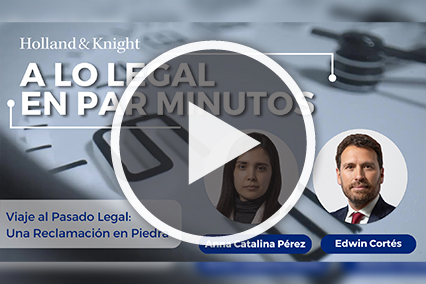
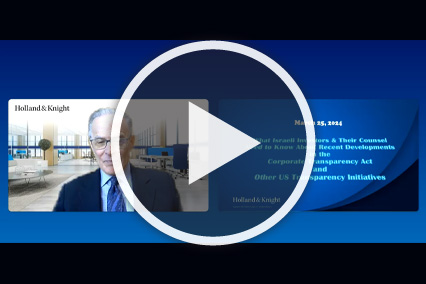
.jpg?rev=-1&hash=A810AC5B48C3CD38B5BF9CDC63E71CC2)
